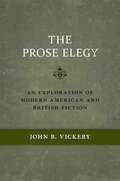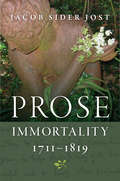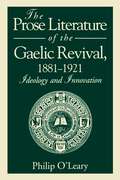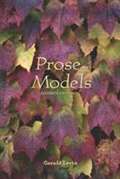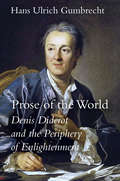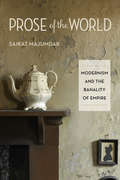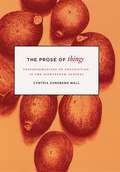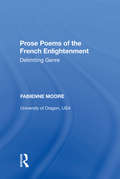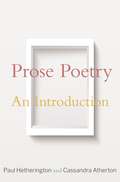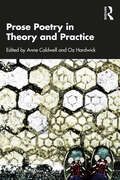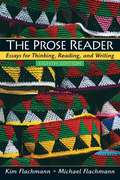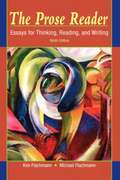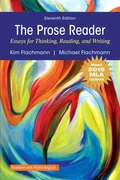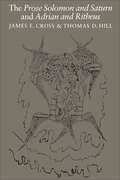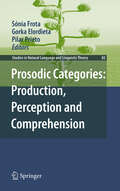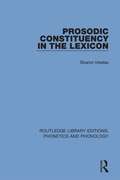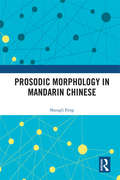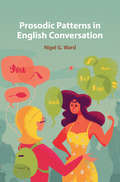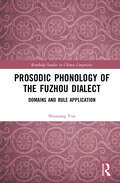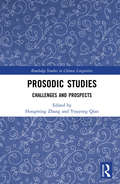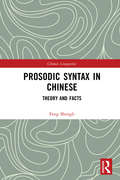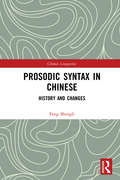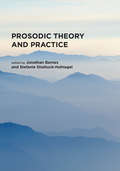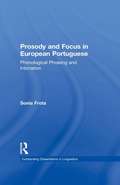- Table View
- List View
The Prose Elegy: An Exploration of Modern American and British Fiction
by John B. VickeryTraditional English poetic elegists offer both writers and readers hope. After lamenting an individual's death and confronting the mortality of all living things, these poets seek consolation from religion, philosophy, or culture for the inevitability of death. The modern prose elegy, however, follows a different path -- one that determinedly questions all possible resolutions. In The Prose Elegy, John B. Vickery continues the work he began in The Modern Elegiac Temper, which examined the form in British and American poetry. He now considers the works of American and British fiction writers from Henry James to Joan Didion and reveals how the elegy expanded into prose and why it evolved so as to deal not only with death but also with other forms of loss.Focusing on individual works, Vickery explores both the forms the elegy takes throughout the twentieth century and the skeptical and uncertain attitudes of writers struggling to confront the trauma of loss. He offers detailed interpretations of the elegiac components in the works of novelists James Joyce, William Faulkner, Virginia Woolf, and Ernest Hemingway, each of whom forged a distinctive style, as well as chroniclers of a pervasive stoicism, such as Malcolm Lowry and Joan Didion, and writers as nuanced as Sherwood Anderson, F. Scott Fitzgerald, James Agee, and Ford Madox Ford.For these writers, Vickery shows, sorrow intrudes upon the personal, intellectual, and cultural aspects of daily living. By exploring how loss touches each of these areas, their books probe intellectual boundaries and discover new elegiac themes. Truman Capote and John Updike, for example, view memory -- which can disappear quickly -- as inherently sad. They therefore elegize memory. What consoles writers of the modern elegy changes too. In place of Milton's religion or Shelley's philosophy, twentieth-century writers also seek comfort from what also saddens them: family, marriage, and ideas of the self. In The Prose Elegy, Vickery convincingly demonstrates that the elegy remains a dominant mode throughout British and American literature -- with perhaps greater pertinence to our lives than ever before.
Prose Immortality, 1711-1819
by Jacob Sider JostWriters have always aspired to immortality, using their works to preserve their patrons, their loved ones, and themselves beyond death. For Pindar, Horace, and Shakespeare, the vehicle of such preservation was poetry. In the eighteenth century, figures such as Joseph Addison, Edward Young, Samuel Richardson, Laetitia Pilkington, Samuel Johnson, and James Boswell invented a new kind of literary immortality, built on the documentary power of prose. For eighteenth-century authors, the rhythms and routines of daily lived experience were too rich to be distilled into verse, and prose genres such as the periodical paper, novel, memoir, essay, and biography promised a new kind of lastingness that responded to the challenges and opportunities of Enlightenment philosophy and evolving religious thought. Prose Immortality, 1711-1819documents this transformation of British literary culture, spanning the eighteenth century and linking journalism, literature, theology, and philosophy. In recovering the centrality of the afterlife to eighteenth-century culture, this prizewinning book offers a versatile and wide-ranging argument that will speak not only to literary scholars but also to historians, scholars of religion, and all readers interested in the power of literature to preserve human experience through time. Winner of the Walker Cowen Memorial Prize for an Outstanding Work of Scholarship in Eighteenth-Century Studies
The Prose Literature of the Gaelic Revival, 1881–1921: Ideology and Innovation
by Philip O'LearyThe Gaelic Revival has long fascinated scholars of political history, nationalism, literature, and theater history, yet studies of the period have neglected a significant dimension of Ireland's evolution into nationhood: the cultural crusades mounted by those who believed in the centrality of the Irish language to the emergent Irish state.This book attempts to remedy that deficiency and to present the lively debates within the language movement in their full complexity, citing documents such as editorials, columns, speeches, letters, and literary works that were influential at the time but all too often were published only in Irish or were difficult to access. Cautiously employing the terms "nativist" and "progressive" for the turnings inward and toward the European continent manifested in different authors, this study examines the strengths and weaknesses of contrasting positions on the major issues confronting the language movement. Moving from the early collecting or retelling of folklore through the search for heroes in early Irish history to the reworking of ancient Irish literary materials by retelling it in modern vernacular Irish, O'Leary addresses the many debates and questions concerning Irish writing of the period. His study is a model for inquiries into the kind of linguistic-literary movement that arises during intense nationalism.
Prose Models (11th Edition)
by Gerald LevinContaining over 110 selections by contemporary and classic writers, PROSE MODELS is a rhetorical reader that covers the major elements of paragraph, essay and methods of development with an emphasis on Argument and Persuasive writing.
Prose of the World: Denis Diderot and the Periphery of Enlightenment
by Hans Ulrich GumbrechtA lively examination of the life and work of one of the great Enlightenment intellectuals Philosopher, translator, novelist, art critic, and editor of the Encyclopédie, Denis Diderot was one of the liveliest figures of the Enlightenment. But how might we delineate the contours of his diverse oeuvre, which, unlike the works of his contemporaries, Voltaire, Rousseau, Schiller, Kant, or Hume, is clearly characterized by a centrifugal dynamic? Taking Hegel's fascinated irritation with Diderot's work as a starting point, Hans Ulrich Gumbrecht explores the question of this extraordinary intellectual's place in the legacy of the eighteenth century. While Diderot shared most of the concerns typically attributed to his time, the ways in which he coped with them do not fully correspond to what we consider Enlightenment thought. Conjuring scenes from Diderot's by turns turbulent and quiet life, offering close readings of several key books, and probing the motif of a tension between physical perception and conceptual experience, Gumbrecht demonstrates how Diderot belonged to a vivid intellectual periphery that included protagonists such as Lichtenberg, Goya, and Mozart. With this provocative and elegant work, he elaborates the existential preoccupations of this periphery, revealing the way they speak to us today.
Prose of the World: Modernism and the Banality of Empire
by Saikat MajumdarEveryday life in the far outposts of empire can be static, empty of the excitement of progress. A pervading sense of banality and boredom are, therefore, common elements of the daily experience for people living on the colonial periphery. Saikat Majumdar suggests that this impoverished affective experience of colonial modernity significantly shapes the innovative aesthetics of modernist fiction. Prose of the World explores the global life of this narrative aesthetic, from late-colonial modernism to the present day, focusing on a writer each from Ireland, New Zealand, South Africa, and India. Ranging from James Joyce's deflated epiphanies to Amit Chaudhuri's disavowal of the grand spectacle of postcolonial national allegories, Majumdar foregrounds the banal as a key instinct of modern and contemporary fiction—one that nevertheless remains submerged because of its antithetical relation to literature's intuitive function to engage or excite. Majumdar asks us to rethink the assumption that banality merely indicates an aesthetic failure. If narrative is traditionally enabled by the tremor, velocity, and excitement of the event, the historical and affective lack implied by the banal produces a narrative force that is radically new precisely because it suspends the conventional impulses of narration.
The Prose of Things: Transformations of Description in the Eighteenth Century
by Cynthia Sundberg WallVirginia Woolf once commented that the central image in Robinson Crusoe is an object—a large earthenware pot. Woolf and other critics pointed out that early modern prose is full of things but bare of setting and description. Explaining how the empty, unvisualized spaces of such writings were transformed into the elaborate landscapes and richly upholstered interiors of the Victorian novel, Cynthia Sundberg Wall argues that the shift involved not just literary representation but an evolution in cultural perception. In The Prose of Things, Wall analyzes literary works in the contexts of natural science, consumer culture, and philosophical change to show how and why the perception and representation of space in the eighteenth-century novel and other prose narratives became so textually visible. Wall examines maps, scientific publications, country house guides, and auction catalogs to highlight the thickening descriptions of domestic interiors. Considering the prose works of John Bunyan, Samuel Pepys, Aphra Behn, Daniel Defoe, Samuel Richardson, David Hume, Ann Radcliffe, and Sir Walter Scott, The Prose of Things is the first full account of the historic shift in the art of describing.
Prose Poems of the French Enlightenment: Delimiting Genre
by Fabienne MooreBy examining nearly sixty works, the author traces the prehistory of the French prose poem, demonstrating that the disquiet of some eighteenth-century writers with the Enlightenment gave rise to the genre nearly a century before it is habitually supposed to have existed. In the throes of momentous scientific, philosophical, and socioeconomic changes, Enlightenment authors turned to the past to revive sources such as Homer, the pastoral, Ossian, the Bible, and primitive eloquence, favoring music to construct alternatives to the world of reason. The result, the author argues, were prose poems, including F lon's Les Adventures de T maque, Montesquieu's Le Temple de Gnide, Rousseau's Le L te d'Ephraïm, Chateaubriand's Atala, as well as many lesser-known texts, most of which remain out of print. The author's treatment of Bible criticism and eighteenth-century religious reform movements reveal the often-neglected spiritual side of Enlightenment culture, and tracks its contribution to the period's reflection about language and poetic invention. The author includes in appendices four unusual texts adjudicating the merits of prose poems, making evidence of their controversial nature now accessible to readers.
Prose Poetry: An Introduction
by Paul Hetherington Cassandra AthertonAn engaging and authoritative introduction to an increasingly important and popular literary genreProse Poetry is the first book of its kind—an engaging and authoritative introduction to the history, development, and features of English-language prose poetry, an increasingly important and popular literary form that is still too little understood and appreciated. Poets and scholars Paul Hetherington and Cassandra Atherton introduce prose poetry’s key characteristics, chart its evolution from the nineteenth century to the present, and discuss many historical and contemporary prose poems that both demonstrate their great diversity around the Anglophone world and show why they represent some of today’s most inventive writing.A prose poem looks like prose but reads like poetry: it lacks the line breaks of other poetic forms but employs poetic techniques, such as internal rhyme, repetition, and compression. Prose Poetry explains how this form opens new spaces for writers to create riveting works that reshape the resources of prose while redefining the poetic. Discussing prose poetry’ s precursors, including William Wordsworth and Walt Whitman, and prose poets such as Charles Simic, Russell Edson, Lydia Davis, and Claudia Rankine, the book pays equal attention to male and female prose poets, documenting women’s essential but frequently unacknowledged contributions to the genre.Revealing how prose poetry tests boundaries and challenges conventions to open up new imaginative vistas, this is an essential book for all readers, students, teachers, and writers of prose poetry.
Prose Poetry in Theory and Practice
by Anne CaldwellProse Poetry in Theory and Practice vigorously engages with the Why? and the How? of prose poetry, a form that is currently enjoying a surge in popularity. With contributions by both practitioners and academics, this volume seeks to explore how its distinctive properties guide both writer and reader, and to address why this form is so well suited to the early twenty-first century. With discussion of both classic and less well-known writers, the essays both illuminate prose poetry’s distinctive features and explore how this “outsider” form can off er a unique way of viewing and describing the uncertainties and instabilities which shape our identities and our relationships with our surroundings in the early twenty-first century. Combining insights on the theory and practice of prose poetry, Prose Poetry in Theory and Practice off ers a timely and valuable contribution to the development of the form, and its appreciation amongst practitioners and scholars alike. Largely approached from a practitioner perspective, this collection provides vivid snapshots of contemporary debates within the prose poetry field while actively contributing to the poetics and craft of the form.
Prose Poetry in Theory and Practice
by Anne CaldwellProse Poetry in Theory and Practice vigorously engages with the Why? and the How? of prose poetry, a form that is currently enjoying a surge in popularity. With contributions by both practitioners and academics, this volume seeks to explore how its distinctive properties guide both writer and reader, and to address why this form is so well suited to the early twenty-first century. With discussion of both classic and less well- known writers, the essays both illuminate prose poetry’s distinctive features and explore how this "outsider" form can offer a unique way of viewing and describing the uncertainties and instabilities which shape our identities and our relationships with our surroundings in the early twenty-first century. Combining insights on the theory and practice of prose poetry, Prose Poetry in Theory and Practice offers a timely and valuable contribution to the development of the form, and its appreciation amongst practitioners and scholars alike. Largely approached from a practitioner perspective, this collection provides vivid snapshots of contemporary debates within the prose poetry field while actively contributing to the poetics and craft of the form.
The Prose Reader: Essays for Thinking, Reading, and Writing (Eighth Edition)
by Kim Flachmann Michael FlachmannThe Prose Reader contains twenty new essays, including an interesting and provocative photo essay. The eighth edition has updated some of the essays, added new authors, and introduced many new topics, such as committing to a place, language acquisition, learning to read, the theory of evolution, girl-fighting, bingeing on college campuses, violence in the United States, gay marriage, graffiti, DNA testing, the Patriot Act, insomnia, and the American Civil War.
The Prose Reader: Essays for Thinking, Reading, and Writing (Ninth Edition)
by Kim Flachmann Michael FlachmannEffective writing through critical thinking. Above all others, this rhetorical patterns reader provides a comprehensive grounding in critical thinking as the foundation for close reading and effective writing. Just as important, by exposing the reader to interesting and insightful prose by a diversity of top writers, the reader is motivated to respond in writing and discussions. By thinking, reading, and writing on three increasingly difficult levels - literally, interpretively, and critically - readers can better learn the processes and skills necessary to be successful in all their writing experiences.
Prose Reader Essays for Thinking, Reading and Writing, MLA Update
by Kim Flachmann Michael FlachmannFor courses in first-year composition. This version of The Prose Reader: Essays for Thinking, Reading and Writing has been updated to reflect the 8th Edition of the MLA Handbook (April 2016)* Organized by rhetorical modes to showcase contemporary works by diverse authors Lucid writing follows lucid thinking - and The Prose Reader, Eleventh Edition helps students think more clearly and logically in their minds and on paper. Organized by rhetorical pattern, this reader builds upon critical thinking as the foundation for close reading and effective writing. Numerous discussion questions and writing assignments for each selection lead students from literal-level responses to interpretation and analysis. These questions, and the essays they frame, immerse students in some of the best examples of professional prose available today. * The 8th Edition introduces sweeping changes to the philosophy and details of MLA works cited entries. Responding to the "increasing mobility of texts," MLA now encourages writers to focus on the process of crafting the citation, beginning with the same questions for any source. These changes, then, align with current best practices in the teaching of writing which privilege inquiry and critical thinking over rote recall and rule-following.
The Prose Solomon and Saturn and Adrian and Ritheus
by James Cross Thomas HillThere are two prose dialogues in Old English, consisting together of some 109 questions and answers. These questions are related to the medieval Latin Joca Monachorum and Adrian and Epictus dialogues and deal with various and quite diverse topics. Some questions concern scripture and Christian tradition – 'How tall was Adam,' 'where did he get his name,' and 'what are the eight parts of which he was made.' Some questions are scientific or quasi-scientific – 'Where does the sun go at night,' 'what is the number of birds.' Others concern riddles or proverbial lore. Together they are the early medieval equivalent of the Guinness Book of Records, a gathering of odd facts and curious information designed to amuse and entertain. This edition from the British Library manuscripts provides translations of these dialogues, and, more important, traces the sources of these sometimes rather curious ideas. The book will be useful to specialists and students concerned with Old English and medieval literature in general. The texts themselves are of some importance and the illustrative material gathered here is relevant to a wide range of problems. Yet the book is also intended, as were the originals, to amuse and instruct a wider audience, a new age of curious readers.
Prosodic Categories: Production, Perception and Comprehension
by Gorka Elordieta Sónia Frota Pilar PrietoLocated at the intersection of phonology, psycholinguistics and phonetics, this volume offers the latest research findings in key areas of prosodic theory, including: *The relationship between intonation and pragmatics in speech production *Sentence modality prosody characterization *The role of pitch in quantity-based sound systems *Consonant-conditioned tone depression phonology across languages *The encoding of intonational contrasts in both intonational and tonal languages Featuring new data and ground-breaking results, the papers draw on empirical approaches that analyze production, perception and comprehension experiments such as the prepared speech paradigm and semantic scaling tasks. These are discussed in a variety of languages, some underrepresented in the literature (such as French and Estonian) while others, such as Shekgalagari, are examined in this way for the first time. This collection of cutting-edge material will be of interest to a broad range of language researchers.
Prosodic Constituency in the Lexicon (Routledge Library Editions: Phonetics and Phonology #9)
by Sharon InkelasFirst published in 1990. This study introduces Prosodic Lexical Phonology, a theory of morphology-phonology interaction. This theory unifies the theoretical treatments of lexical and postlexical phonological rule application. It also provides an explanatory account of systematic discrepancies that have been observed between the parsing of strings for purposes of the morphology, and the parsing of those strings into domains of phonological rule application. This title will be of interest to students of language and linguistics.
Prosodic Morphology in Mandarin Chinese
by Shengli FengIt is not entirely clear if modern Chinese is a monosyllabic or disyllabic language. Although a disyllabic prosodic unit of some sort has long been considered by many to be at play in Chinese grammar, the intuition is not always rigidly fleshed out theoretically in the area of Chinese morphology. In this book, Shengli Feng applies the theoretical model of prosodic morphology to Chinese morphology to provide the theoretical clarity regarding how and why Mandarin Chinese words are structured in a particular way. All of the facts generated by the system of prosodic morphology in Chinese provide new perspectives for linguistic theory, as well as insights for teaching Chinese and studying of Chinese poetic prosody.
Prosodic Patterns in English Conversation
by Nigel G. WardLanguage is more than words: it includes the prosodic features and patterns that we use, subconsciously, to frame meanings and achieve our goals in our interaction with others. Here, Nigel G. Ward explains how we do this, going beyond intonation to show how pitch, timing, intensity and voicing properties combine to form meaningful temporal configurations: prosodic constructions. Bringing together new findings and hitherto-scattered observations from phonetic and pragmatic studies, this book describes over twenty common prosodic patterns in English conversation. Using examples from real conversations, it illustrates how prosodic constructions serve essential functions such as inviting, showing approval, taking turns, organizing ideas, reaching agreement, and evoking action. Prosody helps us establish rapport and nurture relationships, but subtle differences in prosody across languages and subcultures can be damagingly misunderstood. The findings presented here will enable both native speakers of English and learners to listen more sensitively and communicate more effectively.
Prosodic Phonology of the Fuzhou Dialect: Domains and Rule Application (Routledge Studies in Chinese Linguistics)
by Shuxiang YouProsodic Phonology of the Fuzhou Dialect: Domains and Rule Application is the first attempt to conduct a comprehensive analysis of the Fuzhou phonological system from the perspective of prosodic phonology. It addresses the following issues: What prosodic constituents exist in the Fuzhou dialect and what kinds of roles they play in the Fuzhou phonological system; how to define the domain formation of these prosodic constituents in the Fuzhou dialect; what kinds of Fuzhou phonological phenomena make crucial reference to these prosodic constituents as the domain of application; and what implications does the study of the Fuzhou phonological system have for the prosodic phonology theory. This book is a valuable text for students and scholars in the field of Chinese dialectology, Min dialects, prosodic phonology, and phonology-morphosyntax interface.
Prosodic Studies: Challenges and Prospects (Routledge Studies in Chinese Linguistics)
by Hongming Zhang Youyong QianProsody is one of the core components of language and speech, indicating information about syntax, turn-taking in conversation, types of utterances, such as questions or statements, as well as speakers' attitudes and feelings. This edited volume takes studies in prosody on Asian languages as well as examples from other languages. It brings together the most recent research in the field and also charts the influence on such diverse fields as multimedia communication and SLA. Intended for a wide audience of linguists that includes neighbouring disciplines such as computational sciences, psycholinguists, and specialists in language acquisition, Prosodic Studies is also ideal for scholars and researchers working in intonation who want a complement of information on specifics.
Prosodic Syntax in Chinese: Theory and Facts (Chinese Linguistics)
by Feng ShengliIn the two volumes of Prosodic Syntax in Chinese, the author develops a new model, which proposes that the interaction between syntax and prosody is bi-directional and that prosody not only constrains syntactic structures but also activates syntactic operations. All of the facts investigated in Chinese provide new perspectives for linguistic theories as well as insights into the nature of human languages. The subtitles of the two volumes are Theory and Facts and History and Change respectively, with each focusing on different topics (though each volume has both theoretical and historical descriptive concerns). This book has shown that prosody has played a crucial role in triggering the many changes in the diachronic development of Chinese. On the one hand, this book investigates the existence of SOV structures in Early Archaic Chinese, a SVO language, and then demonstrates the role of VO prosody in causing the disappearance of the remnant structures after the Han Dynasty. On the other hand, this book surveys the historical evidence for analyses of bei passives and Ba-constructions, and then offers a prosodic analysis on the origin of these two sentence patterns in Chinese. It is claimed that prosody can be an important factor in triggering, balancing and finally terminating changes in the syntactic evolution of Chinese.
Prosodic Syntax in Chinese: History and Changes (Chinese Linguistics)
by Feng ShengliIn the two volumes of Prosodic Syntax in Chinese, the author develops a new model, which proposes that the interaction between syntax and prosody is bi-directional and that prosody can not only constrains syntactic structures but also activates syntactic operations. All of the facts investigated in Chinese provide new perspectives for linguistic theories as well as the insights into the nature of human languages. The subtitles of the two volumes are Theory and Facts and History and Change respectively, with each focusing on different topics (though each volume has both theoretical and historical descriptive concerns). In this volume, the author first introduces the relevant theories and concepts of Metrical Phonology, Prosodic Phonology and Formal Syntax, and formulates the Government-based Nuclear Stress Rule in Chinese which can explain how and why Mandarin Chinese sentences are structured in a particular way. It is proposed that prosody can not only blocks the legitimate syntactic structures but also activates the potential syntactic operations. The former can be seen from the ungrammatical sentences that are caused by the inoperable NSR in these structures while the latter can be seen from sentences that are derived from syntactic movements which, however, are operable only when being motivated by prosody.
Prosodic Theory and Practice
by Jonathan Barnes and Stefanie Shattuck-HufnagelAn introduction to the the range of current theoretical approaches to the prosody of spoken utterances, with practical applications of those theories.Prosody is an extremely dynamic field, with a rapid pace of theoretical development and a steady expansion of its influence beyond linguistics into such areas as cognitive psychology, neuroscience, computer science, speech technology, and even the medical profession. This book provides a set of concise and accessible introductions to each major theoretical approach to prosody, describing its structure and implementation and its central goals and assumptions as well as its strengths and weaknesses. Most surveys of basic questions in prosody are written from the perspective of a single theoretical framework. This volume offers the only summary of the full range of current theoretical approaches, with practical applications of each theory and critical commentary on selected chapters. The current abundance of theoretical approaches has sometimes led to apparent conflicts that may stem more from terminological differences, or from differing notions of what theories of prosody are meant to achieve, than from actual conceptual disagreement. This volume confronts this pervasive problem head on, by having each chapter address a common set of questions on phonology, meaning, phonetics, typology, psychological status, and transcription. Commentary is added as counterpoint to some chapters, with responses by the chapter authors, giving a taste of current debate in the field. ContributorsAmalia Arvaniti, Jonathan Barnes, Mara Breen, Laura C. Dilley, Grzegorz Dogil, Martine Grice, Nina Grønnum, Daniel Hirst, Sun-Ah Jun, Jelena Krivokapić, D. Robert Ladd, Fang Liu, Piet Mertens, Bernd Möbius, Gregor Möhler, Oliver Niebuhr, Francis Nolan, Janet B. Pierrehumbert, Santitham Prom-on, Antje Schweitzer, Stefanie Shattuck-Hufnagel, A. E. Turk, Yi Xu
Prosody and Focus in European Portuguese: Phonological Phrasing and Intonation (Outstanding Dissertations in Linguistics)
by Sonia FrotaThis work is an investigation of the relation between prosodic structure, intonational structure and (some instances of) focus realisation in European Portuguese (EP). The prosodic account has been developed within the relation-based framework of prosodic hierarchy theory and the autosegmental-metrical theory of intonational phonology. The approach is both theoretical and laboratory phonology research. Based on the analysis of various types of evidence (i.e. Gandhi processes, rhythmic, intentional and boundary strength phenomena), issues such as prosodic layering and the effect of branchingness and phrase length on prosodic phrasing are discussed. Specifically, I-recursion in the form of restricted Compound Prosodic Domains is argued for. Moreover, the fact that the diverse manifestations of prosodic structure point to the same hierarchical organization of the flow of speech into Fs and Is crucially assigns to the prosodic hierarchy a pivotal place in phrasal phonlogy. Attention is paid, furthermore, to aspects of intonational structure like tonal association and alignment, the characterization of leading and trailing tones, and pitch accents structure. It is argued that the HL accents of EP are 'real' bitonal events whose features favour a hierarchical-structured analysis of pitch accent structure. With regard to focus, it is shown that in EP focus is phonologically expressed by means of stress and accents effects and crucially not by means of phrasing effects. And crucially not by means of phrasing effects. Of particular importance is the selection of a special pitch accent to convey (early or late) focus, and the implications it has or the standard positional account of prominence and the stress reversal analysis of prominence patterns. Throughout the work, the EP findings, as well as the proposals set forth, are discussed from a cross-linguistic perspective, with special reference to languages like English, Dutch, German, different varieties of Italian, and Bengali. Also relevant to a general understanding of the prosodic reflexes of focus are languages like Hungarian, Korean, Basque and Wolof.
